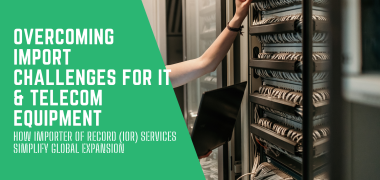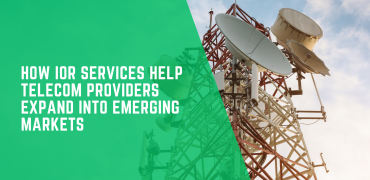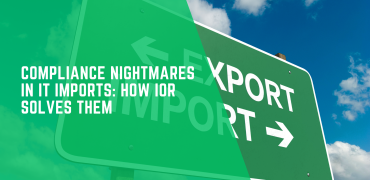As technology continues to connect the world, demand for IT and telecom equipment has surged globally. However, entering new international markets often presents significant hurdles, especially when importing sensitive equipment such as servers, routers, and telecommunications gear. Businesses seeking to import IT and telecom equipment into countries where they lack an established legal presence face an array of regulatory and logistical challenges. From compliance and customs documentation to taxes and duties, the process can quickly become a minefield. Fortunately, an Importer of Record (IOR) service offers a streamlined solution, enabling companies to navigate these barriers smoothly.
In this post, we’ll explore the obstacles businesses encounter when importing IT and telecom equipment into new countries, and how an IOR service can be a powerful ally in simplifying the import process.
Challenges in Importing IT & Telecom Equipment Internationally
For companies with no legal footprint in a target country, importing IT and telecom equipment presents unique challenges. The following hurdles are among the most common and potentially costly:
- Complex Customs and Regulatory Compliance
- Importing technology equipment involves navigating a complex maze of customs regulations and compliance requirements. Every country has its own import laws, and products like network equipment or telecommunications hardware are often subject to stringent regulatory scrutiny due to their nature. Without an understanding of these requirements, companies risk delayed shipments, fines, and even confiscation of goods.
- Additionally, some equipment may require specific certifications or approvals, such as type approvals, safety certifications, or radio-frequency regulations, especially for telecom devices. Navigating these regulatory frameworks can be overwhelming without local expertise.
- Value-Added Tax (VAT) and Duties
- Importing goods typically incurs taxes, such as VAT and customs duties. For businesses without a legal entity in the country, paying these fees can be complicated, as the importer of record (the entity responsible for customs) must assume responsibility for filing and paying taxes on the goods.
- Calculating taxes and duties accurately is essential for maintaining compliance and managing costs. However, without a legal presence in the target country, it’s challenging to handle these requirements directly, and mistakes can lead to hefty penalties.
- Lack of Local Knowledge and Expertise
- The import landscape differs from country to country. Regulatory changes, bureaucratic nuances, and local customs practices are often difficult to keep up with, particularly when you don’t have an in-country office or team to monitor updates.
- An organization attempting to navigate this landscape from abroad risks delays, non-compliance, and lost revenue. Moreover, without a local team, troubleshooting potential issues becomes significantly more challenging, especially when dealing with language barriers and cultural differences.
- Customs Documentation and Record-Keeping Requirements
- Importing IT and telecom equipment requires extensive documentation, from commercial invoices and certificates of origin to import licenses and permits. Each country has its own documentation standards and record-keeping requirements, which can be daunting for companies unfamiliar with the process.
- For businesses lacking in-country expertise, this documentation process is prone to errors, and missing or incorrect paperwork can lead to delays, fines, or rejection of shipments. Furthermore, customs authorities may conduct audits, and companies are required to maintain accurate records for a specified period—yet another challenging task without a physical presence.
- Logistical and Operational Complications
- Handling shipments, storage, and distribution for IT and telecom equipment in a new market poses logistical challenges, especially if sensitive equipment requires specific handling or warehousing conditions.
- Without a local base, coordinating these logistics can be costly and inefficient, especially in countries with strict import controls and limited warehousing infrastructure. Furthermore, companies often struggle with reliable last-mile delivery options in regions with limited logistics infrastructure, affecting the overall supply chain and customer satisfaction.
How an Importer of Record (IOR) Service Eases These Challenges
An Importer of Record (IOR) service serves as a local intermediary and importer on behalf of a company lacking a legal presence in the target country. Here’s how an IOR service can help companies navigate the complexities of importing IT and telecom equipment, reducing risks and ensuring smoother, faster market entry:
- Streamlined Compliance with Local Regulations
- An IOR service acts as the official importer on behalf of your business, assuming legal responsibility for complying with all local regulations and import requirements. They manage the complex customs and regulatory environment, ensuring that your IT and telecom equipment meets local compliance standards, including necessary certifications and approvals.
- With deep knowledge of local regulations, an IOR service provider minimizes the risk of delays, fines, or confiscations, making it significantly easier for your business to operate without needing to become an expert on each country’s laws.
- Efficient Management of Taxes and Duties
- Since an IOR service provider takes responsibility for customs clearance, they handle the payment of VAT, duties, and other taxes on your behalf. This eliminates the need for your business to navigate local tax requirements and filing processes.
- By ensuring that duties and taxes are correctly calculated and filed, an IOR service prevents costly tax-related issues, giving you a clear picture of landed costs. This transparency aids in budgeting and keeps your financial operations compliant from day one.
- Local Expertise and Knowledge
- A reliable IOR service provider brings invaluable local knowledge to the table. They are well-versed in the nuances of local customs, import regulations, and trade practices, helping you avoid common pitfalls that foreign businesses often encounter.
- This expertise helps you navigate the in-country landscape smoothly, enhancing the speed and efficiency of your import processes and reducing the risk of complications. Additionally, IOR providers can often provide insights into the local market, which is beneficial for your strategic planning and operational decisions.
- Complete Customs Documentation Management
- An IOR service handles the entire documentation process, from preparing and submitting paperwork to maintaining accurate records required by customs authorities. With their expertise, IOR providers ensure that all necessary documents are correctly completed and compliant with local laws, reducing the likelihood of delays or fines due to documentation errors.
- As your legal representative for import activities, an IOR provider is also responsible for maintaining records for future audits. This is essential for long-term compliance, as customs authorities may request records at any time to verify proper documentation of previous imports.
- Simplified Logistics and Coordination
- Coordinating logistics in a foreign country without a legal presence is often one of the most challenging aspects of international expansion. An IOR service simplifies this by coordinating shipments, warehousing, and final delivery on your behalf, ensuring that equipment is stored and handled according to required standards.
- Furthermore, an IOR provider can work with local logistics partners to ensure smooth last-mile delivery, even in regions with limited infrastructure. This allows your IT and telecom equipment to reach its destination without unnecessary delays, helping you meet customer expectations and service level agreements.
- Accelerated Market Entry and Reduced Costs
- An IOR service enables you to enter new markets faster and more cost-effectively. By taking on the role of your legal representative, the IOR eliminates the need for you to establish a legal entity or manage complex compliance requirements, saving time and resources.
- The speed and efficiency gained through an IOR partnership reduce operational costs and enable a quicker return on investment. With a streamlined import process, your business can focus on building customer relationships, promoting your brand, and growing your market share in the new region.
When Should You Consider an Importer of Record Service?
An Importer of Record service can be invaluable in the following situations:
- Expanding Internationally Without a Legal Presence: Companies expanding into new markets without a local office or entity benefit significantly from an IOR, as it minimizes the barriers to entry.
- Dealing with High-Value or Sensitive Equipment: Importing IT and telecom equipment involves complex regulatory requirements. An IOR provider is well-equipped to handle these, ensuring compliance and preventing costly mistakes.
- Managing High Volumes of Imports: If your business plans to import large quantities of equipment, an IOR can streamline documentation, tax payments, and customs clearance processes to improve efficiency.
- Reducing Overheads and Speeding Market Entry: For companies seeking fast market entry without significant capital investment, an IOR offers a low-cost alternative to setting up a local presence.
Key Considerations When Choosing an IOR Partner
Selecting the right IOR service provider is essential for a smooth and compliant import process. Here are some factors to consider:
- Experience and Specialization: Look for a provider with specific experience in importing IT and telecom equipment, as these industries often have specialized requirements.
- Global Network: A strong international network can be beneficial if you plan to import equipment into multiple regions.
- Reputation and Reliability: A reputable IOR provider should have positive client testimonials, clear service terms, and a reliable track record of managing imports smoothly.
- Compliance and Transparency: Choose an IOR partner with a clear understanding of local regulations and a commitment to transparency, particularly regarding fees and duties.
Conclusion: Unlock New Markets with an Importer of Record Service
As businesses expand across borders, overcoming import challenges for IT and telecom equipment becomes essential. By partnering with an Importer of Record service, companies can simplify regulatory compliance, streamline documentation, and manage taxes and duties efficiently—all without the need for a local entity. An IOR not only minimizes import-related hurdles but also accelerates market entry, allowing companies to capitalize on new opportunities swiftly.
For companies eager to enter new markets without the complications of establishing a local footprint, an Importer of Record service provides a flexible and reliable solution. Whether you’re launching in one new country or multiple, an IOR can ensure smooth, compliant imports, letting you focus on business growth rather than logistical hurdles.




